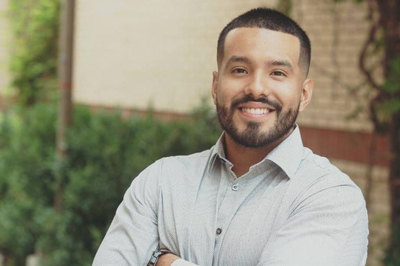Department Spotlight: Byron Garcia

Byron Garcia is a student in the Combined Clinical/Counseling PhD Program at Utah State and a fellow in the National Science Foundation (NSF) Graduate Research Fellowship Program (GRFP). After completing his undergraduate degree and spending a year as a research fellow at University of Kansas, Byron brought his passion for education to USU, where he found a family in his lab with Dr. Rick Cruz as well as in his cohort. As a second-year student, he is focused on completing graduate school, building clinical skills as a therapist in the Behavioral Health Clinical, and conducting research. He is always looking for opportunities to pass along his passion for lifelong learning and academia to students of similar backgrounds.
I want to start up my own lab, extend my independent line of research, mentor other students with the same passion and research interests as mine, and even come up with my own research lab name!
Why did you choose USU?
Utah State University has a very strong multicultural emphasis that aligns very well with my research interests. To that end, interviewing at USU provided me with a sense of a home away from home. The welcoming environment is like none other.
Tell us about your path to graduate school.
I was rejected the first time I applied to graduate school. That really influenced whether or not I was going to continue my studies. I remember receiving no offers and being devastated. Despite the rejections, I found the motivation and drive to find other opportunities. I was eventually offered a position to do extensive research as a post-baccalaureate fellow at the University of Kansas. After completing a year in Kansas, I received multiple offers and chose USU.
You are an NSF fellow. What does that mean to you?
It’s motivating and means a lot to me. For two years, I worked hard on developing strong application materials and I am beyond grateful to have been offered the award. The NSF GRFP has a reputation of helping young researchers become lifelong leaders that contribute significantly to both scientific innovation and teaching. Knowing and understanding this history motivates me to continue my journey in maintaining and advancing research and teaching at the next level.
How does the NSF fellowship change your education?
As a current NSF fellow, the support I receive from the GRFP allows me to develop the skills I need to become an independent researcher. The funding allows me the opportunity to continue my education with a greater push towards my research line of work. While my actual education and curriculum does not change, more of my time and efforts are spent on developing research project ideas and writing.
Who has influenced you most during your time at USU?
I’d have to say my lab sisters and my cohort. When I first started the program, my lab mates welcomed me with open arms. They helped me be successful at the graduate level and at USU. My cohort, on the other hand, has been with me from the start! From the very first day, we have moved together as a team. There is an unwritten rule in our cohort to never let each other fall, no matter the circumstance. Seeing each of them succeed at different things along this journey has been extremely motivational and influential.
What advice do you have for other students?
Make the effort to become close to your cohort. I think it’s really motivating and reassuring to see your cohort move along the program next to you. I also suggest taking care of your mental health and self-care. Having a close circle of friends will help with that, but also devoting some time on the weekends (or when you can) to enjoy the things that bring you happiness and pleasure. With the right circle of friends and mentors, you will have a much smoother transition and an overall better time at USU.

